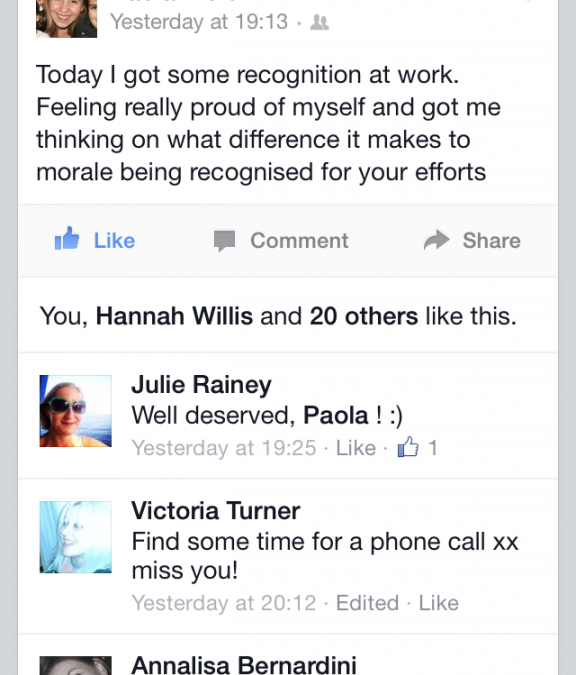Fed up of feedback? Try Feed-Forward
 Has anyone told you anything useful or motivating about what you do and how you do it lately? ‘Feedback’ is a skin-crawly, stomach-tightening word to many people, which is not surprising given most folk aren’t in the habit of letting you know they’d like to ‘give you some feedback’ if they’re going to give you a moment in the sun. However, many of us clamor for more of it because knowing where we stand (certainty) makes us feel safe.
Has anyone told you anything useful or motivating about what you do and how you do it lately? ‘Feedback’ is a skin-crawly, stomach-tightening word to many people, which is not surprising given most folk aren’t in the habit of letting you know they’d like to ‘give you some feedback’ if they’re going to give you a moment in the sun. However, many of us clamor for more of it because knowing where we stand (certainty) makes us feel safe.
If you’re a people manager or parent I hope this column on feed-forward interviewing (FFI) is particularly useful to you. FFI is potentially far more beneficial than feedback.* (Although if you do need to give feedback, get six tips here).
Imagine
Imagine that slightly jaded member of your team leaving a performance review with a small smile and eyes darting as she continues to develop ideas in her mind about what and how she’s going to deliver over the six months. Or think about the son or daughter who’s had a tough time at school but who’s optimistic about being able to build up the good times again. And then there’s the friend who’s been wallowing in self pity about how crap life is and thanks to a short conversation with you he’s beginning to see what she can do to change it. My personal favourite is the career returner who’s now seeing just what she’s capable of and how she’ll make a positive contribution when he comes back from maternity leave. They’ve all been powerfully moved by Feed Forward Interviewing.
What is feed-forward?
It’s a technique where, instead of picking over what’s been done (feedback = the past), you give a person suggestions for the future based on what you believe their skills and strengths to be. Marshall Goldsmith has written a nice piece on 11 reasons to use Feed Forward.
Even more powerful than Feed-Forward, is a technique called Feed-Forward Interviewing (FFI)**, where, instead of you making suggestions, you elicit thoughts from your son, partner, friend, parent, direct report, peer or even line manager about their skills and strengths so that she or he can make more use of them in the future. Psychologists (McDowall, Freeman and Marshall, 2014) found FFI to increase both self-efficacy (feelings of being able to take action and being successful) and goal attainment (actually achieving what’s important to you) in a study that compared feedback with FFI.
How to do Feed-Forward Interviewing at home or work
The process is the same whether working with a child or an adult and given you’re a bright spark I’m making just a few suggestions of the questions/phraseology you might use as I’m sure you can tweak as appropriate. The content below is adapted from that presented by McDowall et al (2014).
The four parts to the conversation are:
1. Elicit a story of success
What? Ask the person to tell a story about them at their best. You might define the timescales, for instance ‘this week at school’ or ‘during the last half year since our last performance review.’
Why? To focus the person on positive emotions; being in a positive mood is linked to increased creativity and willingness to co-operate – which may be useful if you do want to give some constructive feedback.
Example: Thinking about the last six months in your role as Head of European marketing director, when have you felt at your best?
2. Focus on the peak moment
What? Invite the person to describe the peak moment of the experience. Click here for the rationale and an example of how to….
Why? To encourage the person to foster positive emotions and a positive evaluation of themselves. Research tells us we’re disproportionately good at remembering the highest point of a good experience and the end of an experience so it should be easy to recall (which I wrote years ago in a post about how to have a good memory of a holiday of not a great holiday overall!)
Example: From all you’ve told me, what was the highest point for you personally?
3. Clarify the conditions
What? Ask about what was going on at the time the high point was happening – for example, both their inner, mental environment and the environment around them (physical surroundings and other people).
Why? To help the individual (and you, where relevant) understand what the conditions are that lead to these good outcomes so they can be recreated (more frequently and for longer durations).
Example: What was going on at the time that led to or helped you have that high point? For example, were there particular things you were doing/not doing or that others were doing/not doing that helped?
4. Feed Forward to the future
What? Asking questions to work out to what extent there’s a gap between how things are at this moment in time and how they need to be for great results to come about (i.e. understanding how close we are to optimal conditions). In addition, some questions to start action-planning. Click here for the rationale and an example of how to….
Why? Self-reflection can help increase self-motivated change, and, understanding any discrepancy in conditions is the first step to removing potential barriers to achieving good outcomes.
Example: To what extent does what’s happening at the moment in your role and your team (and maybe life outside of work) mirror the conditions you had when you were at your peak? What changes could you make to recreate those conditions? What help do you need from me and others? How does what we’ve talked about so far help you build an action plan for the next six months? (And of course, you’d leave space for responses between each of these questions).
*A huge meta-analysis of research studies exploring the impact of feedback interventions by Avraham Kluger and Angelo DeNisi (1996) found that in a third of cases feedback had a negative effect on performance. Clickhere for the original paper published in Psychological Bulletin.
**A word on the roots of Feed-Forward Interviewing: After Kluger and DeNisi’s research in the mid 90s that showed feedback ain’t all it’s cracked up to be, they clearly thought a lot about what might go in its place. Two years later in 1998 Martin Seligman became president of the American Psychological Association and chose ‘positive psychology’ as his theme (see Seligman and Csikzentmihalyi, 2000) where psychology began to study human strengths, virtues, wellbeing, contentment and happiness. Even before both of these, in 1987 organisational psychologists David Cooperider and Suresh Srivastva, developed an approach to change and decision-making called Appreciative Inquiry which, in a nutshell, starts by exploring what’s working in an organisation in order to improve areas that are working less well. You can read more here.
Over to you
What do you think? Have you used Feed Forward Interviewing? When would it be useful to you?
Related blog posts










